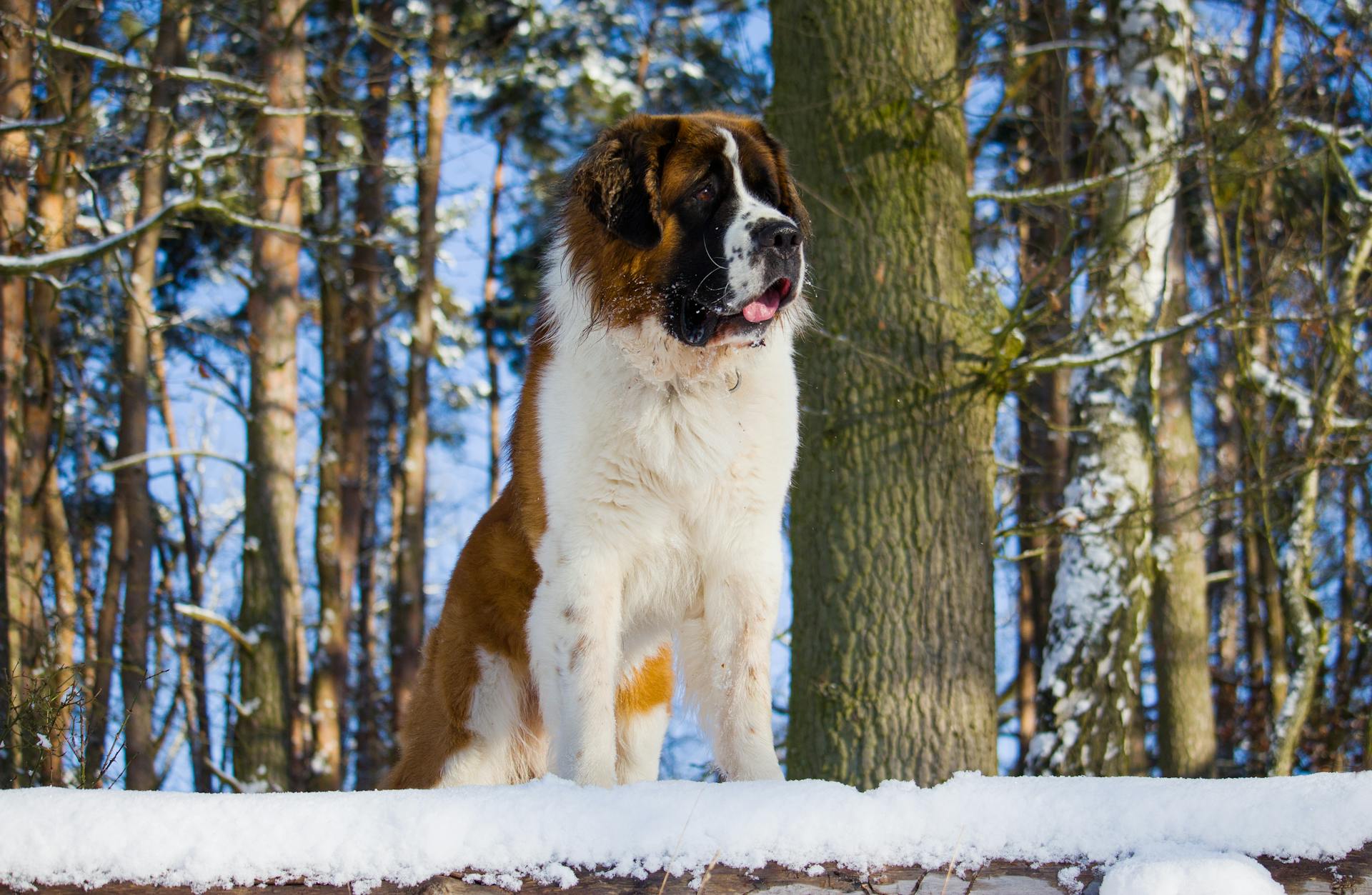
The St Bernard Bernese Mountain Dog Mix is a unique and loving companion, but it's essential to understand the responsibilities that come with owning one. This breed requires regular exercise to stay happy and healthy.
The St Bernard Bernese Mountain Dog Mix needs at least 30 minutes of exercise per day, which can be a combination of walks, runs, and playtime in the yard. This will help keep them physically and mentally stimulated.
Their thick coats require regular grooming to prevent matting and tangling, and they shed heavily, especially during shedding season. This means you'll need to brush them several times a week to keep their coat looking its best.
With proper care and attention, the St Bernard Bernese Mountain Dog Mix can thrive and become a beloved member of your family.
Readers also liked: How to Keep Livestock Guardian Dogs from Roaming
Breed Characteristics
The Saint Bernese is a giant dog breed, which means they can grow to a weight of 100 pounds or more, with some rare cases reaching up to 300 pounds.
These dogs are smart and alert, thanks to their working dog heritage from both the Bernese Mountain dog and the St Bernard.
Their size requires a spacious living arrangement, as they are not well suited for apartment life.
Their intelligence and alertness make them excellent family pets, but their independent nature means they can be stubborn or quiet at times.
Researching both parent breeds is crucial to understanding your Saint Bernese's unique traits and potential health risks.
Health and Wellness
If you're considering bringing a St Bernard Bernese Mountain Dog mix into your family, it's essential to understand the potential health issues they may face. These dogs can be prone to hip dysplasia, which can cause mild discomfort at first but become seriously debilitating over time.
Hip dysplasia is relatively common in this breed, and it's crucial to keep an eye out for signs of discomfort or pain in your dog. Regular exercise and a balanced diet can help prevent or manage this condition.
On a similar theme: Bernese Mountain Dog Hip Dysplasia
Bloat is another serious health issue that can affect deep-chested dogs like the St Bernard Bernese mix. Mild bloat may cause stomach and intestinal discomfort, while severe cases can be fatal if left untreated. Watch for symptoms like excessive panting, a distended abdomen, and seek veterinary help immediately if you notice these signs.
Here are some common health issues to be aware of in St Bernard Bernese Mountain Dog mixes:
- Bloat
- Hip dysplasia
- Osteosarcoma
- Malignant Histiocytosis
To keep your dog healthy, make sure to provide regular checkups and vaccinations, and feed them premium-quality dog food that includes beneficial proteins, omega-3 fatty acids, vitamins, minerals, and plenty of fresh water throughout the day.
Breed Sensitive to Heat
If you live in a region with hot summer months, a Saint Bernese may not be the best fit for you. Both parent breeds are well known for their ability to cope with extremely cold temperatures.
They have double-coated thick, long hair that helps them thrive in Alpine conditions. This makes them ideal companions in cold climates.
Recommended read: Bernese Mountain Dog Cold Weather
However, they struggle to cope with heat and can't tolerate it well. You'll need to take extra precautions to ensure their comfort, such as running AC units and fans day and night.
This is a crucial consideration if you're planning to bring a Saint Bernese into your home. Their heat sensitivity is a trait they inherit from their parent breeds.
Health Issues
Bernese mixes can be prone to certain health issues, so it's essential to be aware of them. Hip dysplasia, heart disease, and cancer are among the most common health issues Berner dogs face.
Regular exercise and a balanced diet can help prevent health issues. Feed your dog premium-quality dog food that contains beneficial proteins, omega-3 fatty acids, vitamins, minerals, and plenty of fresh water throughout the day.
Bloat is a common issue in deep-chested dogs like the Bernese mix. Mild bloat may lead to stomach and intestinal discomfort, while serious bouts can be fatal.
Here are some common health issues associated with Bernese mixes:
- Bloat
- Hip dysplasia
- Osteosarcoma
- Malignant Histiocytosis
If you notice any behavioral or physical changes in your dog, such as excessive panting or a distended abdomen, seek veterinary help immediately.
Owning a Berner
Owning a Berner can be a wonderful experience, but it's essential to consider the size of the dog. They can weigh up to 300 pounds or more, so a spacious home is a must.
You'll need to expect a significant food bill to accompany that, as they require a lot of food to maintain their massive size. They are not well suited to life in an apartment, so if you live in a small space, a Berner might not be the best choice.
A Berner mix, like the Saint Bernese, can weigh up to 120 pounds and enjoys the outdoors, so if you're an active family, this might be a great fit. However, they do require regular exercise and mental stimulation to prevent boredom and destructive behavior.
If this caught your attention, see: Best Dog Food Bernese Mountain Dog
Owning a Dog
Owning a dog is a big responsibility, but with the right mindset and preparation, it can be an incredibly rewarding experience.
The first thing to consider is the size of your dog. A Saint Bernese, for example, is a giant dog breed that will make a giant addition to your home.
They tend to have a more muscular and athletic physique than a St Bernard, which means they'll require regular exercise to stay happy and healthy.
Their size also means they'll need plenty of space to move around, so make sure you have a spacious living area or yard to accommodate them.
A Bernese Mountain Dog mix, on the other hand, can vary in size, but they'll still require regular exercise and attention to stay happy and healthy.
Most Saint Bernese are black, brown, and white, but there's also a good proportion that's just brown and white, so you may not know exactly what color your dog will be until they're born.
A white tip on the tail is considered a sought-after trait, and breeders will often point it out as a desirable feature.
Worth a look: Bernese Mountain Dog Exercise
Owning a Berner
Owning a Berner can be a wonderful experience, but it's essential to be aware of their temperament and needs. Generally speaking, Berners are sweet and gentle, making them terrific family dogs.
They're usually intelligent, friendly dogs that love spending time with their families, with whom they tend to form strong bonds. However, certain traits may vary depending on what breed they are crossed with.
As with any breed, it's essential to socialize them as puppies to ensure they're well-adjusted to other animals and new people. This will help them become confident and calm in new situations.
Berner mixes can make fantastic family pets, but they do require regular exercise and mental stimulation. If you're an active family, a Berner mix might be a great fit for you.
They're not well-suited for life in an apartment, so you'll need to consider whether you have enough space for a giant dog that can weigh up to 120 pounds. The Saint Bernese, for example, can grow to a weight of 300 pounds or more.
A Berner mix's food bill can be substantial, so be prepared to budget accordingly. You'll need to provide them with high-quality food and regular veterinary care to keep them healthy.
As a giant dog breed, Berners require regular grooming to prevent matting and tangling of their thick coats. They also need regular nail trimming and ear cleaning to prevent infections.
Despite their size, Berners are often calm, patient, and affectionate dogs. They make great companions for families who are willing to provide them with the care and attention they need.
Consider reading: Bernese Mountain Dog Care
Grooming and Nutrition
To keep your St Bernard Bernese Mountain Dog mix happy and healthy, grooming and nutrition are essential. Regular grooming is a must, typically every day, with a focus on brushing their coat twice a day when they're shedding.
Their double-layered coat protects them from the cold, but it needs regular attention to prevent matting and tangling. You may need to brush their coat twice a day during shedding season.
Their skin folds around the mouth need to be wiped clean daily to prevent infections. Brushing their teeth at least twice a week is also crucial to keep them healthy. Big ears that flop over need regular cleaning with a damp cloth to prevent wax buildup.
A balanced and nutritious diet is vital for your St Bernard Bernese Mountain Dog mix. Look for dog food made from all-natural ingredients, high in protein and low in grains. This will give your dog the energy they need without exposing them to unhealthy carbs or fats.
Healthy treats are also essential, and it's best to choose ones made from natural ingredients. By prioritizing grooming and nutrition, you'll be well on your way to raising a happy and healthy St Bernard Bernese Mountain Dog mix.
You might enjoy: Smooth Haired Fox Terrier Puppies
Nutrition
To keep your Berner happy and healthy, it's essential to provide a balanced diet that covers all their nutritional needs. Ensure their diet includes plenty of lean proteins, complex carbohydrates, and healthy fats.
Research is key to finding the right nutrition plan for your Berner, as the diet of one dog breed isn't always the same as another. Look for dog food made from all-natural ingredients to avoid fillers or byproducts.
Feeding your Berner a diet high in proteins and low in grains will give them the most energy without exposing them to unhealthy carbs or fats. This is especially important for giant breeds like Berners, which have giant appetites.
Expect to feed between 3 and 4 cups of good quality dog food every day, divided into two or three meals. Avoid providing a constant supply of food to prevent bloat.
Giving your Berner healthy treats is also crucial, so be sure to choose options that are free from harmful ingredients.
See what others are reading: Healthy Bull Terrier
Grooming
Grooming is a crucial part of your Saint Bernese's daily routine, especially given their thick double-layered coat that requires regular brushing.
You'll need to brush their coat every day, and twice a day when they're shedding. This will help prevent matting and tangling.
Their large folds of skin around the mouth need to be wiped clean daily to avoid infections. This is an important part of their grooming routine.
Brushing their teeth at least twice a week is essential to keep them clean and healthy. You should also avoid bathing them unless absolutely necessary, as it can strip their coat of its natural protective oils.
Their big ears that flop over the side of their heads require regular cleaning with a damp cloth to wipe away excess wax or gunk.
Curious to learn more? Check out: Do Corgis Need Grooming
Training and Behavior
Training a Saint Bernese can be a bit challenging due to their independent nature and potential stubbornness.
Positive reinforcement is key when training this breed, so be sure to reward good behavior with treats and praise.
To avoid boredom and keep training sessions exciting, use a variety of enticing toys that can withstand constant chewing and playing.
It's especially important to train your Saint Bernese to not jump up at people when meeting and greeting, and to ensure they can be called back at the dog park.
With patience and consistency, you can develop a strong bond with your Saint Bernese and enjoy a well-behaved companion.
Broaden your view: Saint Bernard Show Dogs
Training
Training your Saint Bernese or Bernese Mountain Dog mix requires patience and consistency. They are intelligent dogs that like to please their owner, but can be headstrong and independent at times.
Positive reinforcement is key when training these breeds. Use enticing toys and keep training sessions short and exciting to avoid boredom.
Saint Bernese can be a bit stubborn, especially for novice owners. They need clear boundaries and consistent reinforcement to learn good behavior.
It's essential to train them to avoid jumping up at people when meeting and greeting, and to ensure they can be called back when at the dog park. Their natural instinct is to roam around open areas.
Training sessions should be fun and engaging, with plenty of rewards and praise. This will help build a strong bond between you and your dog.
Consider reading: When to Breed Female Dog
Bernedoodle
The Bernedoodle is a mix of a Berner and a Poodle, coming in standard, mini, and toy sizes.
Their mini and toy sizes tend to be more hyperactive than the standard Bernedoodle.
These dogs are affectionate and playful, making them great companions.
Their coat is hypoallergenic, which means they're a good choice for people with dog allergies.
For your interest: American Toy Fox Terrier Rescue
Frequently Asked Questions
How big does a St. Bernese get?
A St. Bernese typically grows to be 23-27.5 inches tall and weighs 75-120 pounds, with males being slightly larger than females.
What is the lifespan of a St Bernese dog?
A St. Bernard's typical lifespan is 8 to 10 years, requiring regular care and attention to ensure a long and healthy life.
What is the best breed to mix with Saint Bernard?
While opinions on the "best" mix vary, many Saint Bernard hybrids are popular for their gentle and affectionate nature, making them suitable for families and first-time dog owners. If you're looking for a loyal and loving companion, consider exploring the possibilities of a Saint Bernard crossbreed.
Sources
Featured Images: pexels.com


